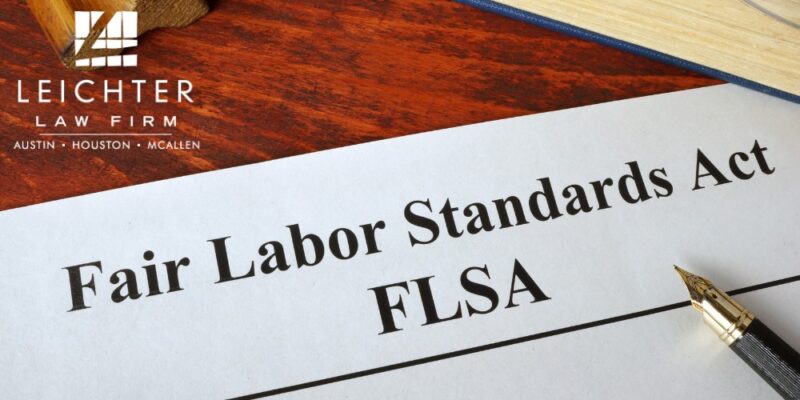Unpaid Overtime Lawyer in Austin and Houston, Texas

When you work a long, stressful week, the last thing you want to see is that you’ve been shorted on your paycheck. The overtime hours you worked should be compensated for overtime pay. Instead, you see that you’ve only been paid your regular wages instead of time and a half, or that you have been denied overtime completely because you have been misclassified as a salaried exempt employee or an independent contractor. You deserve that denied overtime pay because you worked hard for it. If your employer failed to pay wages you were owed, you may have a valid unpaid wage claim. Contact an unpaid overtime lawyer in Austin and Houston, Texas at Leichter Law. To schedule your free, no-obligation consultation with us, please call our office at (512) 495-9995 today.
What Is Unpaid Overtime in Texas?
Federal law enforces the rule that qualifying employees who work more than 40 hours in a workweek are eligible for overtime pay. If your employer fails to pay the overtime you are owed, this is referred to as unpaid overtime. In Texas, eligible employees who work more than 40 hours in a workweek are entitled to at least 1.5 times their regular wages. Therefore, the minimum amount of hourly overtime pay someone can receive is $10.88 an hour. This is 1.5 times higher than the federal minimum wage, which is $7.25 an hour.
Labor laws that apply in Texas state that, if your employer fails to properly pay you an overtime wage, you may be able to file an unpaid overtime lawsuit for back pay and other damages. Employees are also protected from retaliation in the form of termination, suspension, demotions, or other adverse employment actions if they file an overtime complaint.
According to Texas wage and hour laws, the statute of limitations for filing an unpaid wages claim is two years. However, if your employer intentionally shorted you, that deadline extends to three years.
What Are Wage Theft, Unpaid Wages, and Overtime Compensation in Texas?
Along with unpaid overtime, many other terms come to light and often go hand in hand with unpaid overtime claims. Three of these terms are wage theft, unpaid wages, and overtime compensation.
Wage theft occurs when an employer fails to pay their employees according to federal or state law. Many forms of wage theft exist, including minimum wage violations, failing to pay overtime hours, stealing tips, or requiring employees to work off the clock. If you are a victim of wage theft, you have the right to file a claim against your employer for lost wages.
Unpaid wages are those that your employer owes you, but fails to pay you. Another term for this is a withheld salary. Unpaid wage claims can arise from a number of situations, including the following.
- Failure to pay overtime wages
- Failure to adhere to minimum wage laws
- Intentionally miscategorizing an employee to pay them less
- An employee is paid only a portion of their services
- Administrative errors
- Business expenses not being reimbursed
- Disputes about benefits or paid leave
Overtime compensation is calculated as 1.5 times your normal hourly rate of pay. Once you have worked 40 hours in a week, every hour worked after that should receive overtime pay. However, keep in mind that certain occupations are exempt from receiving overtime pay.
What Occupations Are Exempt from Overtime Pay in Texas?
According to federal law, most employees are entitled to overtime compensation. Rather than asking who qualifies for overtime, the easier question is about who does not qualify for overtime. As long as a nonexempt employee works over 40 hours in a workweek, they must receive overtime compensation at a rate of at least 1.5 times their regular pay.
In the following section, we provide a brief overview of exempt vs nonexempt employees in Texas.
Overview of Exempt vs. Non-Exempt Employees
The main difference between the two types of employees concerns overtime pay. Under the rules and regulations of the FLSA, exempt employees are not entitled to overtime pay. To be classified as exempt, you must meet any of the following requirements.
- You are in an administrative role in which you perform office work and have the authority to exercise your own judgment on important business matters. These employees must also make at least $684 per week to be exempt from overtime under the FLSA.
- You work in a computer role, such as computer programming, software engineering, or a similar position. Your primary responsibilities include systems analysis techniques, computer systems tasks, program tasks, or related tasks. Your position must not include manual labor, and you must earn at least $684 per week gross pay to be exempt. If you are compensated at an hourly rate, the rate must be no less than $27.63 an hour.
- You work in an executive role where you are responsible for managing the business, hiring and firing other employees, and other important decisions. To be exempt, you must also earn a salary of at least $684 per week.
- You work in an outside sales role in which you regularly work outside of the place of business. Your primary duties must include making sales or getting contracts or orders for the business. Minimum salaries do not apply in outside sales roles.
- You work in a professional role, such as accounting, engineering, teaching, biology, architecture, and or another professional role. Creative professionals include writers, actors, artists, musicians, and more. To be exempt, you must also earn a salary of at least $684 per week.
Be aware, just because you are paid a salary does not mean you are an exempt employee.
Employees who do not perform exempt duties are entitled to overtime pay even if they are paid a salary. Hourly employees are almost always entitled to overtime regardless of what jobs they perform. As a non-exempt employee, you are entitled to overtime pay for every hour worked beyond 40 in a workweek. Remember, overtime should be paid at no less than 1.5 times your regular hourly rate.
It is important to remember that overtime wage law as it relates to exempt and nonexempt employees can be incredibly complicated and in certain situations not always cut and dry. We pride ourselves in our ability to navigate complex scenarios in federal and Texas overtime wage laws and encourage you to contact us to learn if you have a valid case.
What Are Federal Overtime Laws?
Generally, federal labor and employment laws regarding overtime stem from the Fair Labor Standards Act (FLSA), enacted in 1938. The Act intended to create better working conditions for employees, establish a federal minimum wage, establish overtime pay, regulate child labor, and establish employer recordkeeping standards.
The Fair Labor Standards Act
The Fair Labor Standards Act (FLSA) is a federal labor law that requires overtime pay for non-exempt employees who work more than 40 hours in a week. Generally, all work hours over 40 in a workweek must be paid at a rate not less than 1.5 times the regular pay rate. If you have unpaid or underpaid overtime, you also have certain rights to rectify the underpayment.
Your Overtime Rights Under the FLSA
You have the right to sue a current or former employer who denied or withheld your earned overtime wages. The FLSA includes provisions for individuals or groups of workers to file private lawsuits for unpaid overtime wages.
Under the law, when a company is found to have violated overtime wage laws, they are generally required to pay you double the amount of unpaid overtime wages. When a lawsuit is successful, the violating companies may also have to pay your attorney fees and court costs on top of their overtime penalties.
Retaliation for Unpaid Overtime Claims
Under the FLSA, it is illegal for employers to fire, retaliate or discriminate against you when you file a claim to recover unpaid overtime wages. Under these circumstances, workers can file additional claims against employers who retaliate against employees. If your employer does retaliate against you for filing an overtime claim, our unpaid overtime lawyers will take the necessary steps to help you recover additional damages.
Common Ways Employers Violate Unpaid Overtime Laws
Employers will want to deny any claim workers make about being owed overtime pay, especially if the underpayment was intentional. Often, the employer will fabricate stories to avoid paying their employees their hard-earned overtime wages. Some common examples of employers trying to cover their tracks include the following.
Averaging Hours
Employers may average your hours over several weeks. Say you work 35 hours one week and 45 hours the following week. An employer could average your total hours and say that you worked 40 hours on average per week. However, by law, you deserve overtime pay for the second week.
Paying Compensatory Time
Employers could be paying compensatory time. Also called ‘comp time,’ an employer will essentially give you the option to use your overtime for time off later. This is only legal in the public sector, and if you’re being comped for your overtime, you may be entitled to unpaid wages.
Claiming Ignorance
Employers could be claiming not to know about your overtime. If this is the case, there is usually overwhelming evidence in your favor. If an employee wanted to hide the fact that they were working overtime, this would be difficult to disprove, but we find that this is rarely the case.
Your Legal Status
Employers could not be paying you if you’re an undocumented citizen. This is a slap in the face to any hardworking person in this country even if they do not hold a visa or citizen status. Employers are required by law to pay full wages and overtime to all employees, regardless of legal status.
Beneficial Work Time
Employers could claim that overtime work couldn’t classify as beneficial work time. The courts have good guidelines on what they consider useful work time to qualify as overtime. If the work is of a genuine benefit to the employer and they don’t intervene to stop you from continuing your work, or the employer knows or at least has a reason to believe that the work is being done, then the employer must pay you for your overtime work.
Types of Workers Most Often Denied Overtime Wages
Any employee can be denied rightful overtime pay. However, certain categories of employees more commonly lose out on being paid the hard-earned wages they deserve. Examples of these professions include the following.
Independent Contractors
Employers often try to avoid paying overtime by making you an “Independent Contractor.” Simply being a contract worker does not mean that you are not entitled to overtime pay. If you have agreed to be a contract worker or 1099 employee, you may still be entitled to overtime pay. Contact our unpaid overtime attorneys as soon as possible to explore your options.
Hourly Employees
If an employer requires or pressures you to work “off-the-clock” before your shift to prepare for the workday (starting the computer, reading emails, preparing tools or equipment), work during an unpaid lunch period, post-shift to close out the workday (e.g. finalizing paperwork, sending reports), or work from home, you may be entitled to overtime pay for that time worked.
Salaried Employees
Many people believe you are not entitled to overtime if you are a salaried employee. The truth is that many salaried employees are entitled to overtime pay even if they hold a job title such as “manager,” “office manager” or, “administrative assistant”. Employees in these situations are most likely being misclassified to avoid paying them overtime. You are not automatically exempt from FLSA protections because you receive a salary. Employers must still compensate employees who are nonexempt, regardless of their role.
Day Rate Workers
Paying employees a “day rate” or “daily rate” is very common, especially in Texas oilfields. However, when Texas oilfield workers go beyond 40 hours of work in a week, they are generally entitled to overtime pay even if they are paid a day rate.
Janitorial Workers
Janitorial personnel and custodians play a crucial role in both our society and the functioning of businesses. They are indispensable for maintaining clean and safe working environments. These dedicated individuals invest extensive hours in the demanding tasks of cleaning, organizing, and sanitizing their workplaces.
Regrettably, some employers exploit custodial staff by neglecting to provide them with the overtime pay they deserve. Withholding overtime compensation from janitorial workers is unlawful and could lead to potential claims under the Fair Labor Standards Act (FLSA).
Call Center Employees
In recent years, the telemarketing and call center industry has experienced significant growth, largely driven by the proliferation of service-oriented companies. Within these call centers, you’ll find various roles, including customer service representatives and IT support personnel, all dedicated to assisting customers.
It’s highly likely that if you’ve ever contacted a company for assistance or had an inquiry, you’ve interacted with a call center professional. Unfortunately, many call center employees frequently face the issue of unpaid overtime wages. If you are employed in a call center, and your employer is failing to provide fair compensation, we encourage you to reach out to Leichter Law today.
How Do I Sue for Unpaid Overtime in Texas?
If you have been denied overtime wages owed to you, you may have the basis to take legal action. Federal laws clearly state that nonexempt employees must be paid overtime. If your employer fails to do this, you can begin the claims process. The laws that regulate overtime compensation are complex and your employer will likely have access to lawyers to protect them. Therefore, you should seek a qualified employment law attorney to protect your rights before you begin the process.
How Much of Your Unpaid Wages Can You Recover?
So, how much can you actually recover in a successful unpaid overtime lawsuit? Most importantly, you can recover the wages you were originally owed. You can also recover what is called liquidated damages. Liquidated damages are a form of compensation for the delay in receiving your original payment. In many cases, you can even collect attorneys’ fees and court costs as damages in your case. To learn more about your recovery options, it’s best to speak with experienced employment attorneys about your case.
Why Choose Leichter Law as Your Unpaid Overtime Lawyer?
If your employer is using any of the tactics mentioned above, or you feel you’re being schemed out of your overtime wages in other ways, we welcome the opportunity to help you recover the money you’re owed.
One major benefit of working with us is having a Board-Certified Labor and Employment Law attorney by your side. Less than 1% of Texas lawyers hold this certification, making a world of difference as you seek a fair settlement and the wages you’ve rightfully earned.
When you hire our law firm, you show your employer you won’t back down when they commit wage theft against you. Our law firm will ensure that your voice is heard and that not a dime of your money is left on the table.
When it comes to an employer’s wrongdoing, we have seen just about every example of it. Our approach starts and ends with your needs in mind. We firmly believe in fair wages for fair work, so we aim to fight for employees who aren’t getting the earnings they deserve.
Contact a Texas Unpaid Wages Lawyer with Leichter Law Today
Leichter Law Firm offers an initial free consultation and private evaluation of your potential unpaid overtime claim. The time limit for filing unpaid overtime lawsuits is shorter than you think, so don’t hesitate to seek help from an expert. Call us at (512) 495-9995 to schedule a consultation with a Texas labor and employment law specialist.
Get in Touch
Office Locations
1602 E 7th St
Austin, TX 78702
Phone: (512) 495-9995
Get Directions
3700 N Main St
Houston, TX 77009
Phone: (713) 714-2446
Get Directions
214 N 16th St #128
McAllen, TX 78501
Phone: (956) 205-0884
Get Directions
- Unpaid Overtime Lawyer Cibolo, TX
- Unpaid Overtime Lawyer Converse, TX
- Unpaid Overtime Lawyer McAllen, TX
- Unpaid Overtime Lawyer New Braunfels, TX
- Unpaid Overtime Lawyer San Antonio, TX
- Unpaid Overtime Lawyer San Marcos, TX
- Unpaid Overtime Lawyer Schertz, TX
- Unpaid Overtime Lawyer Seguin, TX
- Unpaid Overtime Lawyer Timberwood Park, TX
- Unpaid Overtime Lawyer Cibolo, TX
- Unpaid Overtime Lawyer Converse, TX
- Unpaid Overtime Lawyer McAllen, TX
- Unpaid Overtime Lawyer New Braunfels, TX
- Unpaid Overtime Lawyer San Antonio, TX
- Unpaid Overtime Lawyer San Marcos, TX
- Unpaid Overtime Lawyer Schertz, TX
- Unpaid Overtime Lawyer Seguin, TX
- Unpaid Overtime Lawyer Timberwood Park, TX





